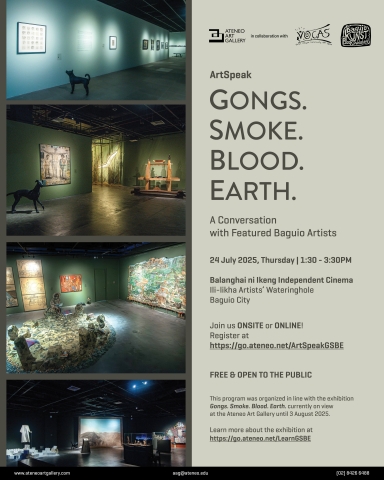Living Laudato Si’: Faith in Action for Our Earth
20 May 2025 | Rose Ann B Reballos
On Saturday, 15 February 2025, I had the opportunity to be one of the speakers for the Kapawa Formation online session, organized by the Ateneo Grade School Social Involvement Office (SIO) for the Kapawa Leaders from the Kapawa hu Paglaum (Light of Hope) Scholarship and Formation Program in Malaybalay, Bukidnon, under the Jesuit ministry of the Fr Leoni Mission Foundation Inc (FLMFI). As I prepared, I found myself reflecting deeply on the profound connection between faith, culture, and environmental responsibility. Speaking before the Kapawa Leaders, I was reminded that Laudato Si’ is not just a call to action but a spiritual invitation to understand our place in the world as stewards of creation. Sharing my personal experience from the Asia Pacific Contextual Theology for Engagement Program (ACOTEP) in Kota Kinabalu, Malaysia, added a unique layer of insight, as it allowed me to speak from a place of personal learning and cultural immersion. I could speak to the power of witnessing how an indigenous community like the Kadazan-Dusun integrates ecological balance into their way of life, reflecting exactly what Pope Francis calls for in Laudato Si’.
Through this experience, I learned that environmental responsibility is not something abstract or separate from our faith or culture. It is deeply embedded in the values and practices of indigenous communities that have long lived in harmony with nature. I was able to share how the Kadazan-Dusun community, for example, has developed sustainable practices over generations, caring for their land not only as a resource but as a living, sacred entity.
I also recognized how Laudato Si’ urges us to reflect on our own roles within the greater web of life highlighting our interconnectedness and the delicate balance that exists within nature. As I spoke, I felt a deep responsibility to convey that environmental care isn’t just about protecting the Earth but about ensuring that we are also honoring our relationships with one another and the world around us.
What stood out most to me during this experience as a sharer was the realization of the need for collective action. Laudato Si’ speaks of the importance of communities coming together to take shared responsibility for creation. In ACOTEP, I saw how a community, through cooperation, education, and collective effort, was able to protect its land from exploitation. Their commitment to sustainability, their collective decision-making, and their respect for indigenous knowledge gave me a renewed sense of hope that transformation is possible when we unite. It is in the seemingly small decisions we make daily—whether in how we treat the environment, how we consume resources, or how we live out our faith—that the true impact of Laudato Si’ will be felt.
I believe that this talk wasn’t just about imparting knowledge—it was about creating a space for dialogue and action. As I shared my story, I found myself learning just as much from the Kapawa leaders. Their responses and the discussions that followed reminded me that the journey to living sustainably and responsibly is a shared one. It's not about perfection but about continuous learning, adaptation, and growth.
In the end, this experience reaffirmed my commitment to live out the teachings of Laudato Si’. I left the session feeling more connected to both the natural world and to the global community, knowing that through collective effort, small acts of care, and honoring the wisdom of diverse cultures, we can all contribute to the healing of our common home. As I continue this journey, living the Laudato Si', I hope to inspire others to join me, knowing that each step taken—no matter how small—has the power to make a difference.
Rose Ann B Reballos
Campus Minister, AGS
Mission Integration - Ignatian Spirituality Formation




